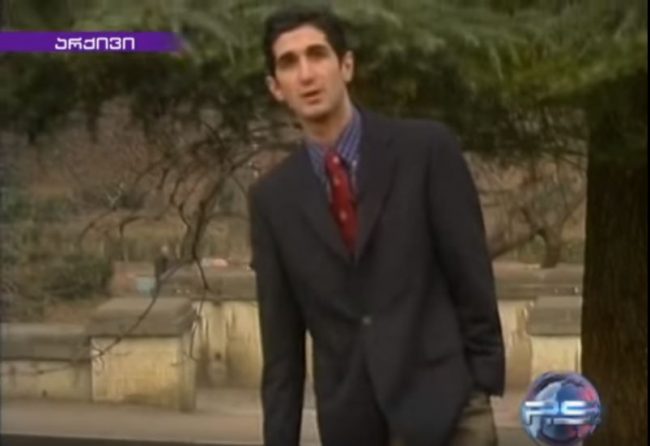
 A number of former Georgian officials have been implicated in the 2001 murder of journalist and TV host Giorgi Sanaia. Rustavi 2 cited infamous criminal Konstantine Tsikhistavi as confessing to have taken part in the plot, and accusing the authorities of a cover-up.
A number of former Georgian officials have been implicated in the 2001 murder of journalist and TV host Giorgi Sanaia. Rustavi 2 cited infamous criminal Konstantine Tsikhistavi as confessing to have taken part in the plot, and accusing the authorities of a cover-up.
Geogrigan TV channel Rustavi 2 broke the story on 18 February, saying that Tsikhistavi, who is serving time for attempting to assassinate former Deputy Interior Minister Gia Lortkipanidze, contacted them to name Sanaia’s ‘real killer’, as well as the people behind the plot.
Tsikhistavi named his former accomplice Shota (Mevlud) Chichiashvili, a former Georgian intelligence officer, as Sanaia’s killer. According to him, the murder was ordered by Vladimer (Kakha) Bakuradze, former head of the police’s Anti-Corruption Department, and Tamaz Tamazashvili, former head of the Kakheti Police. Tamazashvili is the father-in-law of former Prime Minister Irakli Gharibashvili.
Tsikhistavi claims the murder had been planned months in advance.
‘Creating a motive for murder’
In the wake of Sanaia’s death, media reports suggested he was murdered for being in possession of a videotape showing a Pankisi-based criminal group negotiating a drug deal with then-officials. Elene Tevdoradze, then–head of Parliament’s Human Rights Committee, confirmed at the time the existence of the videotape.
Tsikhistavi says the recording was ordered by the officials months before Sanaia’s death, to ‘create a motive’ for his murder.
However, Tsikhistavi says he objected to this plan, and as a result, the investigation did not pursue the supposed ‘Pankisi tape’.
‘Taking the blame’

Sanaia, who anchored late-night political programme Ghamis Kurieri (Night Carrier), was killed in his flat in July 2001. His murder sparked widespread public outrage.
A number of media reports at the time suggested the murder might have been politically motivated. But in December, Grigol Khurtsilava was arrested after confessing to the murder, claiming Sanaia had tried to ‘sexually abuse’ him. In July 2003, Khurtsilava was sentenced to 13 years, and was released in 2014. Tsikhistavi told Rustavi 2 that Khurtsilava agreed to take the blame because he was in debt.
Sanaia’s brother, Vakho Sanaia, denied any knowledge of Tsikhistavi’s allegations, but confirmed that Khurtsilava had ‘serious problems, and not only financial’.
‘No one would be amazed if it turned out that [Khurtsilava] agreed to this deal and took the blame’, Vakho Sanaia said.
Calls to reopen the investigation
According to Rustavi 2, Tsikhistavi was involved in several criminal activities in the early 2000s, including drug trafficking and abductions of prominent people. They reported that he went on hunger strike on 18 February, urging the authorities to listen to his allegations.
Chichiashvili, who Tsikhistavi named as Sanaia’s killer, was reportedly also involved in a number of criminal activities, in the 1990s and 2000s. He was arrested in Moscow in 2002 on Georgia’s request, and extradited two years later. He was released in an amnesty in 2013 and left Georgia soon afterwards.
In a 2017 interview with Rustavi 2, after opposition leader Givi Targamadze accused him of plotting to blow up his car, Chichiashvili said that Tsikhistavi was a ‘friend turned enemy’.
Tsikhistavi had claimed the people behind the plot wanted ‘to get rid of pro-Western’ political forces and their supporters.
The Prosecutor’s Office has yet to comment on weather Sanaia’s case will be reopened.




 19 February 2018
19 February 2018


